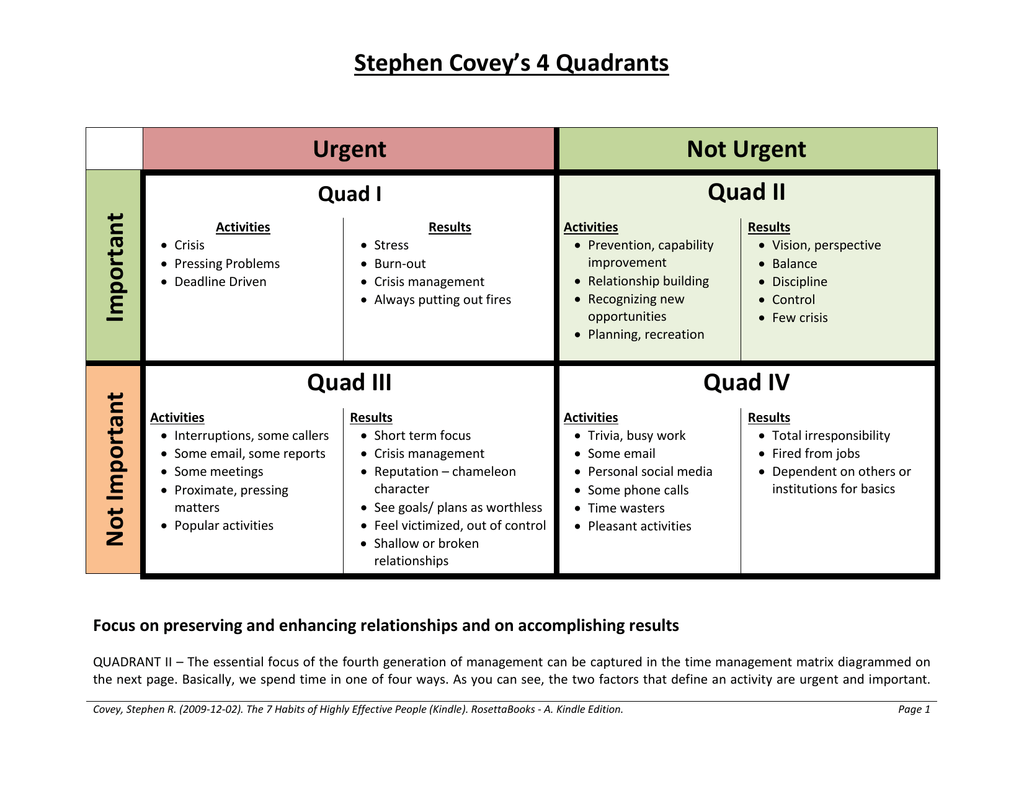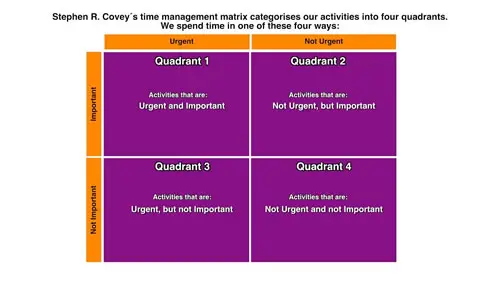
Ideally, you're spending 30% of every day on this. At least 10% of your day needs to be devoted to this important but not urgent stuff. The most important thing you can do in your career relating to this simple two-by-two matrix is to do some Quadrant 2 stuff (not urgent but important) every day. With better awareness and better planning, you can really cut this stuff down. Most of us don't realize how much of this stuff we do every day and we think it's important when it's really not. You also need to severely restrict the Quadrant 3 stuff (urgent and not important). Mark Zuckerberg has built a $100 billion empire off our inability to stop doing Quadrant 4 stuff! You have to - as much as you can - eliminate the Quadrant 4 tasks (not urgent and not important). You never have to worry about the tasks in Quadrant 1 (the urgent and important tasks). Now, we're always connected and ready to respond to the latest issue.

Back in 1989, people used to pack up at 5pm on Friday and be gone until Monday morning at 9am. Email, the Internet, Cell Phones, Twitter. In fact, things in business since the 7 Habits book was published in 1989 have only made us more focused on Urgent stuff. You'll always be drinking from the firehose on these urgent tasks. You'll never clear up time on your schedule. Only, guess what? You're like a hamster on the wheel. If someone stopped you and asked you whether the way you're spending your time on these urgent tasks is helping you to get to your long-term goal (whatever that is) of, for example, starting your own company, getting into a new industry, or reaching your next big job promotion, you'd probably say: "No, but I just need to get this stuff done to clear up time on my schedule so that I can do those things." You're simply trying to get one thing off your plate, so you can breathe for half a second and get to the next emergency to get off your plate. What you'll quickly realize is that you've only been spending time on urgent tasks each week. If you simply spend 30 minutes at the beginning of each week thinking about these 4 quadrants and what you want to spend your time on in the coming week, you will be 10x more productive than you usually are. Yet, we'd be amazed how much time we waste in a given week on these tasks. We prioritize these things in the moment and obviously derive some pleasure from them, but they are really not urgent or important. It mind be mindlessly eating potato chips, even though we're not hungry. It's checking and rechecking Facebook and Twitter during the day, because we think we might miss something.
#STEPHEN COVEY 4 QUADRANTS PDF TV#
It's watching a mindless TV show at the end of the day.

These things we do because we feel like we're tired and need a break. These are other activities which we tell ourselves in the moment that we must do but - if we stopped ourselves to really think about - we'd realize they aren't that important. These are poorly thought-out meetings that soak up our time, but which we have to attend because we already accepted the invite. These are interruptions that happen, such as phone calls. They clog up our time today but, when we look back at these things at the end of the week, we'll have to admit they were a waste of time. These tasks are the biggest reason we're not more successful in the long-term. It could be attending a conference to learn about some new area that you've heard a little bit about and which sounds promising but might not pan out into anything. It's having a lunch with an important contact or client.

They are things we know we need to get to but probably will push off. These are the things that matter in the long-term but will yield no tangible benefits this week or even this year. When we do fire-fighting, it's all relating to stuff in this quadrant. The most pressing meetings or deadlines fall into this category. These are the most pressing of tasks we'll likely get to this week. If you remember one thing, and one thing only, about the Seven Habits of Highly Effective People book, here it is:Īt the start of every week, write a two-by-two matrix on a blank sheet of paper where one side of the matrix says "urgent" and "not urgent" and the other side of the matrix says "important" and "not important." Then, write all the things you want to do that week. "quadrant two" items that are important but not urgent and so require greater attention for effective time management (Photo credit: Wikipedia) Time management matrix as described in Merrill and Covey 1994 book "First Things First," showing.


 0 kommentar(er)
0 kommentar(er)
